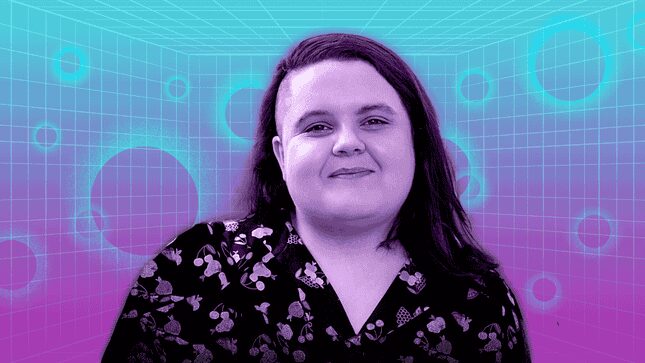Aimee Hart Wants You to Know That Video Games Wouldn’t Exist Without Queer People
The hate can be "debilitating" but the "most positive things I’ve ever experienced..come from gaming," the head of Gayming Magazine said of the industry.
Makers of NowThe Experts

This article is part of our new women in gaming series, Makers of Now.
Queer indie video games mean a lot to Aimee Hart. In fact, they mean so much to the Editor-in-Chief of Gayming magazine—the first video gaming website dedicated to the LGBTQ community—that when asked about some of her recent favorites, she pauses our Zoom conversation and goes quiet for several minutes just to make certain she’s not about to leave any out. It’s this profound care for and knowledge of the indie gaming industry that’s quickly catapulted Hart, who uses she/they pronouns, to the top of the “home of queer geek culture,” as Gayming calls itself.
Based in the U.K., the website was conceptualized in 2019 by Robin Gray as a direct response to the lack of representation for queer gamers and has swiftly established an audience of over 1.5 million people in just four years.
What began as a site that strictly covered gaming has expanded to an events platform—boasting fêtes like the world’s first LGBTQ+ gaming awards ceremony and Gayming LIVE Online, which convened video games, drag artists, and queer culture in one virtual room last year.
As Hart wrote in her introduction letter as editor-in-chief in 2021: Gayming isn’t just cis, white and skinny. Gayming is fat. Gayming is trans. Gayming is BIPOC. Gayming is for everyone. These aren’t just words, but a mission statement by which the magazine—and Hart—navigate a more traditionally exclusionary space.
In our conversation, Hart told Jezebel about her long-held passion for queer indie narratives, the unique perils women and queer people face in the gaming industry and world at large, and what still needs to change.
How did you arrive at Gayming magazine?
Before Gayming, I was a freelance writer for a ton of different websites, mostly indie ones like Game Revolution. When I first started getting into gaming, I was just fascinated by the queer context and subtext of video games. I think that made me stand out—and not always in a good way. At the time, I wasn’t really sure what to write about outside of my own experience with gaming, so when I was writing these kinds of articles, I had a lot of pushback immediately. The people I was working with were always like, “You gotta get your voice out there, you’ve got to be special,” and that came with a lot of blowback [online]. But there were some positives to it as well, because people noticed what I was writing about and would reach out to me which was always nice and special.
I moved on from gaming publications to the Daily Star, which is a publication in the U.K., and I was working with some really cool editors. One was queer and always looked out for me. Somebody suggested I meet with Robin; he lives like a 20 minute train ride from me, so I met him, and he basically said that he wanted to create a publication that was for LGBTQ gamers in a way that—yes, obviously you’ve got really great websites doing so many cool things and highlighting the people Gayming does, but it’s always felt more like, monthly or occasionally. Robin wanted something focusing entirely on LGBTQ people in gaming and that’s how I got brought in initially as Gayming magazine’s deputy editor.
When you talk about blowback online, was that directed at what you were writing or at your identity?
-

-

-

-

-

-

-

-

-

-

-

-

-

-

-

-

-

-

-

-

-

-

-

-

-

-

-

-

-

-

-

-

-

-

-

-

-

-

-

-








































